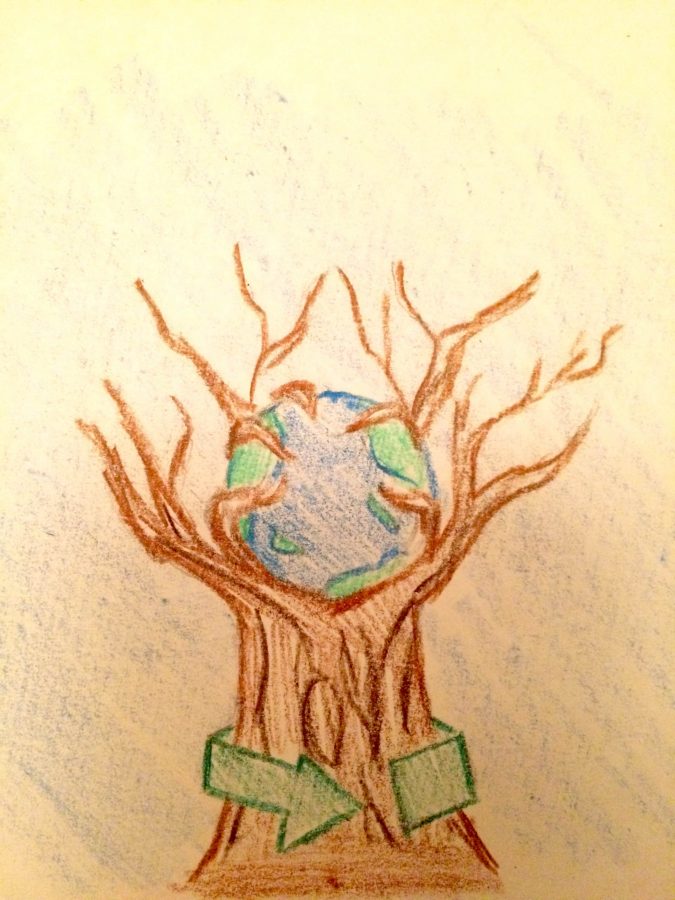Preservation of the Nation
December 12, 2016
The comforting croaking of frogs surrounds you as the steady chirping of crickets fills the empty air. The silent, towering trees cocoon you in the moon’s glowing light. The relaxed river beside you gently undulates and the gentle breeze sends the fresh scent of lavender spinning through the sky. But then suddenly, two blinding yellow lights shine their greedy eyes, cutting through the peace. The cricket’s former rhythm now rises into a tumult and the trees crash lifeless, without warning, to the Earth. Brackish and black with the fumes of the merciless engine, the river now spews rotten smelling clouds. As dramatic a situation this may seem, the degradation of nature is a harsh reality. Given the downhill acceleration of the environment’s health, people’s job as inhabitants of this planet demands that they preserve what nature so kindly provides for them.
The rapid deterioration of our environment makes the future very uncertain for global citizens. In full accordance, Kaivu Hariharan ‘20, exclaims, “Species are dying out at a completely unprecedented rate, global temperature is rising at a degree a year, and carbon dioxide levels just passed 400 atmospheric parts per million. The future is here, and it is not pretty.” Every hour, 1,692 acres of land turns into unusable desert and that Garbage Islands, the size of Europe, Africa, and Mexico combined, exist in the middle of the ocean [1]. If people continue on this path, they will extinguish the bounty that nature provides, such as the clean water, the fresh air, and the beautiful landscape. To many, this premonition makes sense; for others, it is fictitious.
An unfortunate fact is that even though environmental degradation affects everyone, not everyone feels, or even cares about, its effects. When asked why many people do not seek to aid the environment, Dilara Shahani ‘18, states, “Many of us don’t really feel the effects and there are so many issues in the world that seem more imperative for our attention that many people don’t care enough to help the environment.”
True: how many of us in the United States lose access to clean water because of pollution? Or better yet, how many of us suffer and die from the toxic chemicals released into the atmosphere by industrial machines?
Though these occurrences do not occur quite often, in reality, people indirectly inflict these fatal health effects on themselves through their treatment of the environment. Excessive carbon emissions and excessive toxins released into the environment cause harmful respiratory issues in humans. Additionally, deforestation, overpopulation, and landfills very quickly take up more space the Earth has to offer, alarmingly reducing biodiversity [2].
Unfortunately, humans have put themselves in a never-ending cycle. Professor Will Steffen of the Australian National University and the Stockholm Resilience Centre believes, “The economic system is driving us towards an unsustainable future and people of [following] generation[s] will find it increasingly hard to survive. History has shown that civilizations have risen, stuck to their core values, and then collapsed because they didn’t change. That’s where we are today” [3].
Steffen captures the essence of human greed in blaming it for the Earth’s depletion. In the beginning, human want of money (economic advancements) led to industrialism, tourism, and mining, which all began turning the wheels of environmental degradation. Despite the myriad mountains (of filth) people have climbed to correct the wrongs done to the environment, and because of the inherent obstinacy that thrives in each person, the (frankly) disgusting behavior people have towards Earth may never truly change. Still, in the end, we must do our best to overcome whatever challenges may occur, in order to achieve a better environmental and economic future.
[1] http://www.theworldcounts.com/stories/environmental-degradation-facts
[2] http://www.conserve-energy-future.com/causes-and-effects-of-environmental-degradation.php
[3] https://www.theguardian.com/environment/2015/jan/15/rate-of-environmental-degradation-puts-life-on-earth-at-risk-say-scientists





